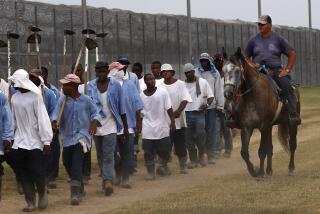Humbled by the Generosity of Fellow Inmates
- Share via
JOHANNESBURG, South Africa — Hard labor in a Zimbabwean prison might have broken Roy Bennett if not for the other prisoners, who took over his work hauling jugs the size of water coolers from a sewage-infested river and muttered quiet words of encouragement.
For a white farmer, the generosity of the black prisoners jailed for crimes of survival was humbling: Before his release in June 2005, he often found scraps of impossible-to-come-by meat filched from the prison’s kitchen and stuffed into his bedroll.
Since 2000, the opposition politician’s belongings have been looted, his land occupied by invaders, his workers beaten, raped and in one case killed, his house taken, his coffee farm seized by the Zimbabwean government and his freedom lost for eight months in a case condemned by Amnesty International.
He believes all of it was politically motivated and carried out by the regime of longtime President Robert Mugabe, which has redistributed white-owned farms to blacks and ruthlessly suppressed dissent.
Four times he has been left with nothing but the contents of his suitcase -- thrice when his farm was invaded and looted and once when he fled to South Africa in March after police discovered an arms cache and sought him for questioning on treason charges, an offense that carries the death penalty.
The South African government in late May denied Bennett’s asylum application, concluding that there was no reason to believe he would not be treated fairly. He plans to appeal.
The rejection by South Africa’s Department of Home Affairs has been criticized by the opposition and human rights activists. Nicole Fritz, director of the South African Litigation Center, writing in the Star newspaper, said that at best the decision reflects incompetence; at worst an unwillingness to help those in need.
Bennett, rosy-skinned and round-faced, has the complexion and physique of a prosperous farmer. He seems almost an accidental hero who could have trundled through life without a care if not for the circumstances in his country.
“I feel very heartsore, because what has happened in Zimbabwe is not even political. It’s a result of tyranny and greed,” said Bennett, a third-generation Zimbabwean.
Mugabe’s policies have triggered the collapse of agriculture. Inflation is above 1,000%, there is a severe hard-currency shortage, hospitals lack medicines and the population is hungry.
Growing up on his father’s remote farm, Bennett’s only friends were the children of the black workers, about eight of whom he says remain close friends.
As a coffee farmer, he honored the rituals demanded by local tribal tradition, setting aside produce for two chiefs and making sacrifices to keep the river mermaid of legend happy. He made certain the rain-making rituals were never neglected.
Bennett says he went into politics at the request of local chiefs and others in his area.
In prison, Bennett said, fellow inmates and guards helped him not only for humane reasons but in support of his status as a member of the opposition fighting the regime. Prisoners constantly talked of their suffering and their yearning for political change, he said.
Most days in prison, Bennett’s labor consisted of walking waist-deep into the filthy river, filling two 5-gallon cans and carrying them 200 yards to water a vegetable garden. He had to haul water all day long.
“I battled at the beginning. I battled with the whole process. I was determined to see it through and not to break under the conditions. I didn’t want the authorities to break me,” Bennett said in an interview in Johannesburg.
When he arrived, he was forced to strip in front of senior prison officials loyal to Mugabe’s ZANU-PF party and was given a soiled uniform torn around the crotch, affording no decency.
Only when the prison bosses or ZANU-PF guards approached would the lower-level guards harass him, he said. Later they would tell him they were sorry.
“It was a very humbling experience because the prisoners and the guards did everything to make my life better,” he said. “They could see I was battling. They’d come and encourage me and give me a hand and say: ‘Just keep going. It’s not that bad, you’ll get used to it just now.’ ”
Bennett says that as a politician he wanted to represent the local people and improve their lives. He tried to join ZANU-PF before the parliamentary elections of 2000, hoping to change the culture of corruption and impunity from within.
“I thought naively that it would be possible to bring about proper representation for the people,” he recalled. The ruling party eschewed his candidacy. At that time, the opposition was embryonic, but Bennett switched to the Movement for Democratic Change.
In May 2000, after his switch, his farm was invaded by Mugabe loyalists. Bennett was in the capital, Harare, but they rounded up and beat his workers, and when Bennett’s wife, Heather, tried to intervene, one of the invaders held a machete to her throat and forced her to sing ZANU-PF political songs. Pregnant at the time, she miscarried soon after.
The invaders occupied the farm for three weeks, looting everything from the house. In the next four years, ZANU-PF officials, the military and police repeatedly looted the farm, harassed, beat and intimidated the staff, killing a worker in 2003. The next year, the army and police seized the farm.
Despite Zimbabwe’s economic crisis, widespread hunger and human rights abuses -- including the government’s nationwide razing of shacks last year that left at least 700,000 people homeless -- African leaders have been reluctant to criticize Mugabe. Some accuse foreign journalists of bias against Mugabe, but others admire him as a liberator who freed his country from white minority rule.
Bennett tries to avoid upsetting the South African government and doesn’t criticize its decision to deny him asylum. Instead, he says he is sure he will get a fair hearing in the appeal process.
But he called on African leaders to recognize the abuses and “tyranny” in Zimbabwe and the suffering of ordinary people.
“In Zimbabwe, you now have totalitarian rule where there’s been institutionalized violence. Total thug rule is what exists in Zimbabwe today,” he said.
“There’s got to be a bursting point for everyone, no matter how passive you are,” he said. “I believe people in Zimbabwe are moving to that point. I do believe it’s going to happen. It could happen this year.”
More to Read
Sign up for Essential California
The most important California stories and recommendations in your inbox every morning.
You may occasionally receive promotional content from the Los Angeles Times.













